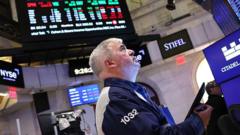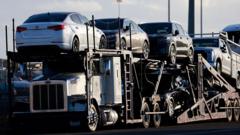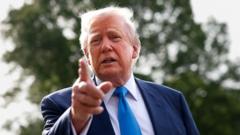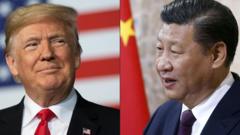**With the vote approaching, Australian politicians are grappling with the implications of Trump's presidency, particularly his controversial trade policies.**
**Trump's Shadow Cast Over Australia's Upcoming Election**

**Trump's Shadow Cast Over Australia's Upcoming Election**
**As Australia gears up for its federal election, Donald Trump's global influence looms large, complicating domestic political campaigns.**
In a scene reminiscent of Americana, a crowd in Western Sydney savors fried food and tastes the thrills of rodeo events, all while keeping a keen eye on the international political landscape. Amidst bull rides and barrel racing, the vibrations of global politics echo through the arena, particularly with the shadow of US President Donald Trump's second term looming over Australia’s federal election set for May 3.
Rodeo enthusiast Guy Algozzino, clad in cowboy attire, passionately supports Trump's tariffs, asserting, “Tariffs are great; it’s about time we had protection.” This sentiment is contrasted by more ambivalent observers like Jared Harris, who views the unfolding global drama through an entertaining lens, expressing a tendency to remain detached from the political heft of these developments.
While Trump’s initial election invoked little concern among Australians, his second term has sparked a realization of the global ramifications his tariffs impose. Prime Minister Anthony Albanese has publicly bemoaned the repercussions of Trump's policies, stating that imposing tariffs without exemptions is “not the act of a friend”—a stark contrast to Australian values of loyalty and mateship.
As the election approaches, the political atmosphere mirrors a chaotic rodeo as candidates, especially Albanese and opposition leader Peter Dutton, grapple with both domestic priorities like healthcare and the looming uncertainties of US relations. A shift in political fortunes sees the Labor Party leading recent polls with 54% of the two-party vote, prompting analysts to speculate about how Trump's unpredictable actions may bolster Albanese’s standing amidst a perceived crisis.
A nuanced examination of Australia’s alliances manifests as the country faces China's rising power, pushing leaders to scrutinize historically strong ties with the US. Despite only 5% of its exports directed to America, the current political environment highlights the necessity of maintaining crucial defense agreements like Aukus, especially as Trump appears increasingly dismissive of these relationships as evidenced by his recent comments.
Meanwhile, as candidates face off under the public's scrutiny in debates, Trump's figure enters the dialogue, revealing a desire for strong leadership untainted by the need to appease the US President. While Dutton initially sought to align himself with Trump’s persona, recent shifts indicate a need for a more assertive stance that resonates with Australian voters.
Political analysts draw parallels between the current Australian situation and a recent Canadian election, underscoring how adversarial vibes can inadvertently boost support for incumbents. With many Australians viewing Trump negatively, the incumbent Labor government finds itself potentially benefitting from a rally-around-the-flag effect as it seeks to assert its stability amidst international turbulence.
In a landscape where relationships with global allies appear strained, the electorate remains eager to witness how their next leader will navigate the challenges ahead. As the rodeo spectators cheer on the riders, so too will Australians watch closely as their political leaders prepare for the impending electoral battle and the tumultuous alliances that will shape their future.
Rodeo enthusiast Guy Algozzino, clad in cowboy attire, passionately supports Trump's tariffs, asserting, “Tariffs are great; it’s about time we had protection.” This sentiment is contrasted by more ambivalent observers like Jared Harris, who views the unfolding global drama through an entertaining lens, expressing a tendency to remain detached from the political heft of these developments.
While Trump’s initial election invoked little concern among Australians, his second term has sparked a realization of the global ramifications his tariffs impose. Prime Minister Anthony Albanese has publicly bemoaned the repercussions of Trump's policies, stating that imposing tariffs without exemptions is “not the act of a friend”—a stark contrast to Australian values of loyalty and mateship.
As the election approaches, the political atmosphere mirrors a chaotic rodeo as candidates, especially Albanese and opposition leader Peter Dutton, grapple with both domestic priorities like healthcare and the looming uncertainties of US relations. A shift in political fortunes sees the Labor Party leading recent polls with 54% of the two-party vote, prompting analysts to speculate about how Trump's unpredictable actions may bolster Albanese’s standing amidst a perceived crisis.
A nuanced examination of Australia’s alliances manifests as the country faces China's rising power, pushing leaders to scrutinize historically strong ties with the US. Despite only 5% of its exports directed to America, the current political environment highlights the necessity of maintaining crucial defense agreements like Aukus, especially as Trump appears increasingly dismissive of these relationships as evidenced by his recent comments.
Meanwhile, as candidates face off under the public's scrutiny in debates, Trump's figure enters the dialogue, revealing a desire for strong leadership untainted by the need to appease the US President. While Dutton initially sought to align himself with Trump’s persona, recent shifts indicate a need for a more assertive stance that resonates with Australian voters.
Political analysts draw parallels between the current Australian situation and a recent Canadian election, underscoring how adversarial vibes can inadvertently boost support for incumbents. With many Australians viewing Trump negatively, the incumbent Labor government finds itself potentially benefitting from a rally-around-the-flag effect as it seeks to assert its stability amidst international turbulence.
In a landscape where relationships with global allies appear strained, the electorate remains eager to witness how their next leader will navigate the challenges ahead. As the rodeo spectators cheer on the riders, so too will Australians watch closely as their political leaders prepare for the impending electoral battle and the tumultuous alliances that will shape their future.





















